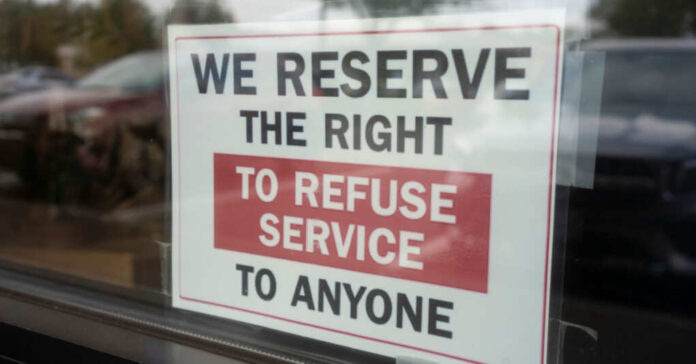
Studio 8 Hair Lab owner Christine Geiger is finding herself in a hairy situation after a Facebook post on her salon’s page advised potential trans customers to “seek services at a local pet groomer.”
The salon, based in Traverse City, Michigan, posted, “If a human identifies as anything other than a man/woman, please seek services at a local pet groomer. You are not welcome at this salon. Period. … This is America; free speech. This small business has the right to refuse services.”
The post followed a recent U.S. Supreme Court decision that ruled in favor of a Colorado web designer who refused to create a wedding website for same-sex couples. The owner of 303 Creative LLC argued her state’s anti-discrimination law compels her to create wedding websites for same sex-couples, something that is directly at odds with her beliefs.
The SCOTUS found that the website designs were a form of speech and that her First Amendment rights allowed her to refuse services that conflicted with her faith.
While the post, along with the Studio 8 Hair Lab’s Facebook page, was removed, Geiger could face legal action based on a 2022 Michigan Supreme Court ruling which prohibits discrimination based on sexual orientation and gender identity.
ACLU of Michigan’s staff attorney Jay Kaplan points out that Studio 8 Hair Lab offers services that are not qualified as protected by the First Amendment.
“We don’t believe that she falls under that exemption,” Kaplan said. “That applies to (careers) like speech writers or muralists, where they’re conveying a certain message with their product. Very few customers are going to come to somebody who says, ‘No, I don’t care what (haircut) you want.’ That’s not the way she’d operate.”
Washtenaw County Prosecutor Eli Savit agrees, claiming the salon was in violation of Michigan’s Elliott-Larsen Civil Rights Act which “expressly forbids businesses from ‘deny(ing) the full and equal enjoyment’ of ‘goods and services’ because of a person’s ‘gender identity or expression.’
For anyone wondering: this action is flatly illegal under Michigan law–and the recent Supreme Court decision in 303 Creative doesn't change that.
— Eli Savit (@EliNSavit) July 11, 2023
Savit tweeted, “303 Creative involved a web designer who refused to make wedding websites for same-sex couples. … But the decision was limited to ‘expressive conduct.’”
He went on to say, “The court did not say that, in general, business owners may ignore state anti-discrimination laws (like Elliott-Larsen). Those laws still generally apply, albeit with a constitutional carve-out for ‘expressive’ conduct.”
But Geiger is standing behind her statements. “This stance was taken to ensure that clients have the best experience,” the salon owner said, “and I am admitting that since I am not willing to play the pronoun game or cater to requests outside of what I perceive as normal.”
She went on to clarify her stance, explaining, “I have no issues with LGB. It’s the TQ+ that I’m not going to support. For those that don’t know what the + is for, it’s for MAP (Minor Attracted Person, aka pedophile.”
She went on to note,” There are over eight hundred licensed stylists in the County. There are plenty of salons/stylists willing to cater to what I will not. This is a free country, and I am not a slave to any narrative.”
Geiger’s stance calls to mind the 2018 case brought before the SCOTUS by a baker who refused to make wedding cakes for same-sex couples because of his faith. Bakery owner Jack Phillips won that suit but later lost a similar case where he refused to create a birthday cake celebrating a gender transition.
What made the second suit perplexing was that the customer ordered the cake on the same day that SCOTUS agreed to hear the first case, meaning that she was fully aware of the bakery’s stance on creating cakes for the LGBTQ+ community.
Phillips explained that while he welcomed LGBTQ+ customers to purchase premade baked goods, he would not create customized bakery items at odds with his religious beliefs. During the trial, Autumn Scardina revealed that she had deliberately chosen the bakery to “challenge the veracity” of Phillips’ statements that he would serve LGBTQ+ customers.
Geiger’s post runs afoul of the state’s laws regarding discrimination. Attorney General Dana Nessel said that the SCOTUS’ recent decision would not impact Michigan’s civil rights laws, noting that it could not be “applied to protect against discrimination in the provision of public accommodations that do not constitute speech.”
But the First Amendment protects more than free speech. It also mandates freedom of religion and the ability to practice one’s religious beliefs without interference from the federal government.
This right was further clarified in the Fourteenth Amendment, which forbids states from enacting laws that inhibit a religion. This verbiage could be interpreted to mean that forcing a Christian to act in direct opposition to their beliefs is prohibited under the Constitution.
Geiger’s pending legal battle is only the beginning. Ultimately, a case like this will end up in the hands of the SCOTUS to decide if freedom of religion is truly protected or if it’s doomed under the progressive agenda.











